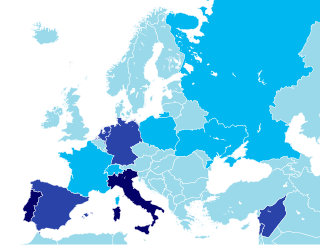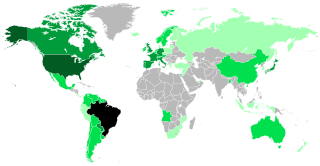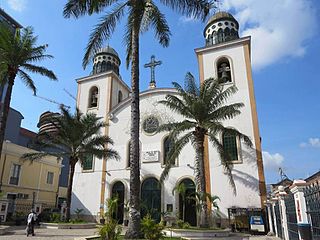Related Research Articles

A quilombo is a Brazilian hinterland settlement founded by people of African origin, and others sometimes called Carabali. Most of the inhabitants of quilombos, called quilombolas, were maroons, a term for escaped slaves.
Angolan Portuguese is a group of dialects and accents of the Portuguese language used mostly in Angola, where it is an official language. In 2005 it was used there by 60% of the population, including by 20% as their first language. The 2016 CIA World Fact Book reports that 12.3 million, or 47% of the population, speaks Portuguese as their first language. However, many parents raise their children to speak only Portuguese. The 2014 census found that 71% speak Portuguese at home, many of them alongside a Bantu language, breaking down to 85% in urban areas and 49% in rural areas.

Immigration to Brazil is the movement to Brazil of foreign peoples to reside permanently. It should not be confused with the forcible bringing of people from Africa as slaves. Latin Europe accounted for four-fifths of the arrivals. This engendered a strikingly multicultural society. Yet over a few generations, Brazil absorbed these new populations in a manner that resembles the experience of the rest of the New World.
Banco Angolano de Investimentos, short BAI, was founded in 1996 as the first private bank in Angola. The BAI is a full-service bank operating in Angola with a nationwide network of (mid-2012) 89 branches in all 18 provinces, with 41 of those branches in Luanda Province. In 9 of the 18 provinces, BAI operates only one branch office.

A quilombola is an Afro-Brazilian resident of quilombo settlements first established by escaped slaves in Brazil. They are the descendants of Afro-Brazilian slaves who escaped from slave plantations that existed in Brazil until abolition in 1888. The most famous quilombola was Zumbi and the most famous quilombo was Palmares. Many quilombolas live in poverty.

Brazilians are the citizens of Brazil. A Brazilian can also be a person born abroad to a Brazilian parent or legal guardian as well as a person who acquired Brazilian citizenship. Brazil is a multiethnic society, which means that it is home to people of many ethnic origins, and there is no correlation between one's stock and their Brazilian identity.

Portuguese Angolans are citizens of Angola who are either descended from Portuguese people or Portuguese emigrants permanently living in Angola. The number of Portuguese Angolans precipitously dropped during and immediately after the Angolan War of Independence, but several hundreds of thousands have either returned or emigrated to live in Angola. As of 2022, they make up approximately 0.6% of Angola's population.

Angola–Brazil relations are the bilateral relations between Angola and Brazil. As former Portuguese colonies, Angola and Brazil share many cultural ties, including language and religion. Both nations are members of the Community of Portuguese Language Countries, Group of 77 and the United Nations.

Brazil had an official resident population of 203 million in 2022, according to IBGE. Brazil is the seventh most populous country in the world, and the second most populous in the Americas and Western Hemisphere.
Angolan Americans are an ethnic group of Americans of Angolan descent or Angolan immigrants. According to estimates, by the year 2000 there were 1,642 people descended from Angolan immigrants in the United States. However, the number of Angolan Americans is difficult to determine. Many African-Americans are descendants of Angolan enslaved people. In 1644, most of the 6,900 slaves bought on the African coast to clear the forests, lay roads, build houses and public buildings, and grow food came from the established stations in Angola.
Lesliana Massoxi Amaro Gomes Pereira, known simply as Lesliana Pereira, is an Angolan actress, model and beauty pageant titleholder. She was crowned Miss Angola 2007. She went on to represent her country at Miss Universe 2008, but was unplaced. In 2014, she starred in the film Njinga: Queen Of Angola, a role that earned her Best Actress at the 11th Africa Movie Academy Awards.

The recapture of Bahia was a Spanish–Portuguese military expedition in 1625 to retake the city of Bahia in Brazil from the forces of the Dutch West India Company (WIC).

The Brazilian War of Independence, was waged between the newly independent Brazilian Empire and the United Kingdom of Portugal, Brazil and the Algarves, which had just undergone the Liberal Revolution of 1820. It lasted from February 1822, when the first skirmishes took place, to March 1824, with the surrender of the Portuguese garrison in Montevideo. The war was fought on land and sea and involved both regular forces and civilian militia. Land and naval battles took place in the territories of Bahia, Cisplatina and Rio de Janeiro provinces, the vice-kingdom of Grão-Pará, and in Maranhão and Pernambuco, which today are part of Ceará, Piauí and Rio Grande do Norte states.

Brazil–Spain relations are the current and historical relations between Brazil and Spain. Both nations are members of the Organization of Ibero-American States.
Leyzller Jorge Lopes de Araújo, known as Jorge Araújo or simply Araújo, is a Portuguese footballer who plays as a right back or right winger. He also holds an Angolan passport.
Sergio Henrique Francisco, simply known as Serginho, is a Brazilian professional footballer.

The Atlantic slave trade to Brazil occurred during the period of history in which there was a forced migration of Africans to Brazil for the purpose of slavery. It lasted from the mid-sixteenth century until the mid-nineteenth century. During the trade, more than three million Africans were transported across the Atlantic and sold into slavery. It was divided into four phases: The Cycle of Guinea ; the Cycle of Angola which trafficked people from Bakongo, Mbundu, Benguela and Ovambo; Cycle of Costa da Mina, now renamed Cycle of Benin and Dahomey, which trafficked people from Yoruba, Ewe, Minas, Hausa, Nupe and Borno; and the Illegal trafficking period, which was suppressed by the United Kingdom (1815-1851). During this period, to escape the supervision of British ships enforcing an anti-slavery blockade, Brazilian slave traders began to seek alternative routes to the routes of the West African coast, turning to Mozambique.

Deolinda Rodrigues Francisco de Almeida was an Angolan nationalist, militant, writer, and translator, who also taught, wrote poetry, and worked as a radio host. Born into a Methodist family, she received a scholarship to study in Brazil, from where she corresponded with Martin Luther King Jr. Fearing extradition, she continued her education in the United States before returning to Angola. Rodrigues was a member of the People's Movement for the Liberation of Angola (MPLA) and co-founded its women's wing, the Organização da Mulher de Angola. She was captured, tortured, and executed by a rival nationalist group in 1967. A documentary of her life was released in 2014.
Tiago Lima Leal, commonly known as Tiago Azulão, is a Brazilian professional footballer who plays as a forward for Angolan club Petro Luanda. He earned his nickname, "Azulão", after wearing all blue clothes to play football when he was ten.
Events from the year 2020 in Angola.
References
- ↑ "Angolanos no Brasil" (in Portuguese).
- ↑ "Angolanos são a maioria dos refugiados africanos no Brasil". VOA (in Portuguese). August 4, 2011.
- ↑ "Prácticas sociales". el-exportador.com (in Spanish). Archived from the original on 2014-02-26. Retrieved 2014-03-06.
- ↑ Villar, María (4 June 2012). "Los "protectores" de la capoeira en España". Faro de Vigo (in Spanish).